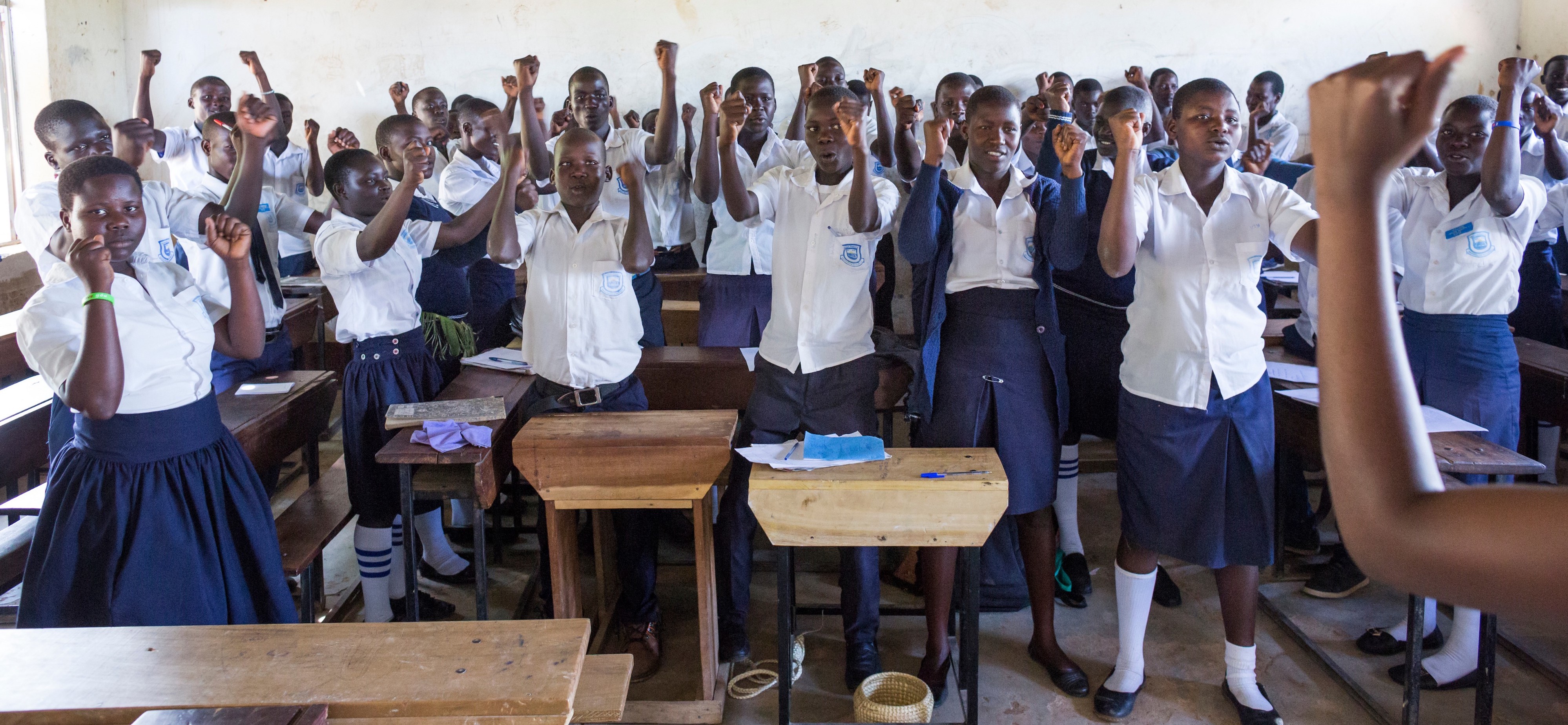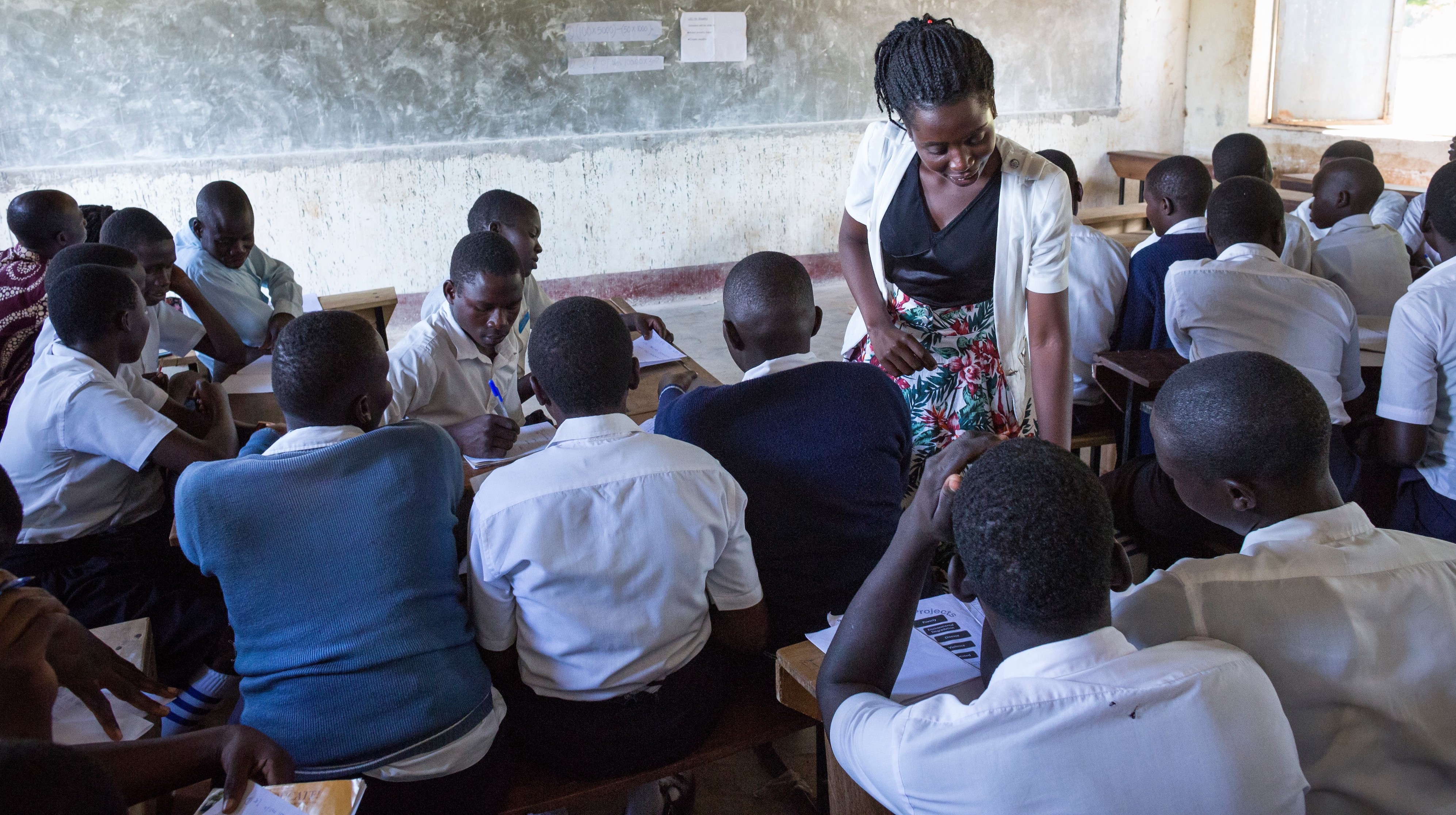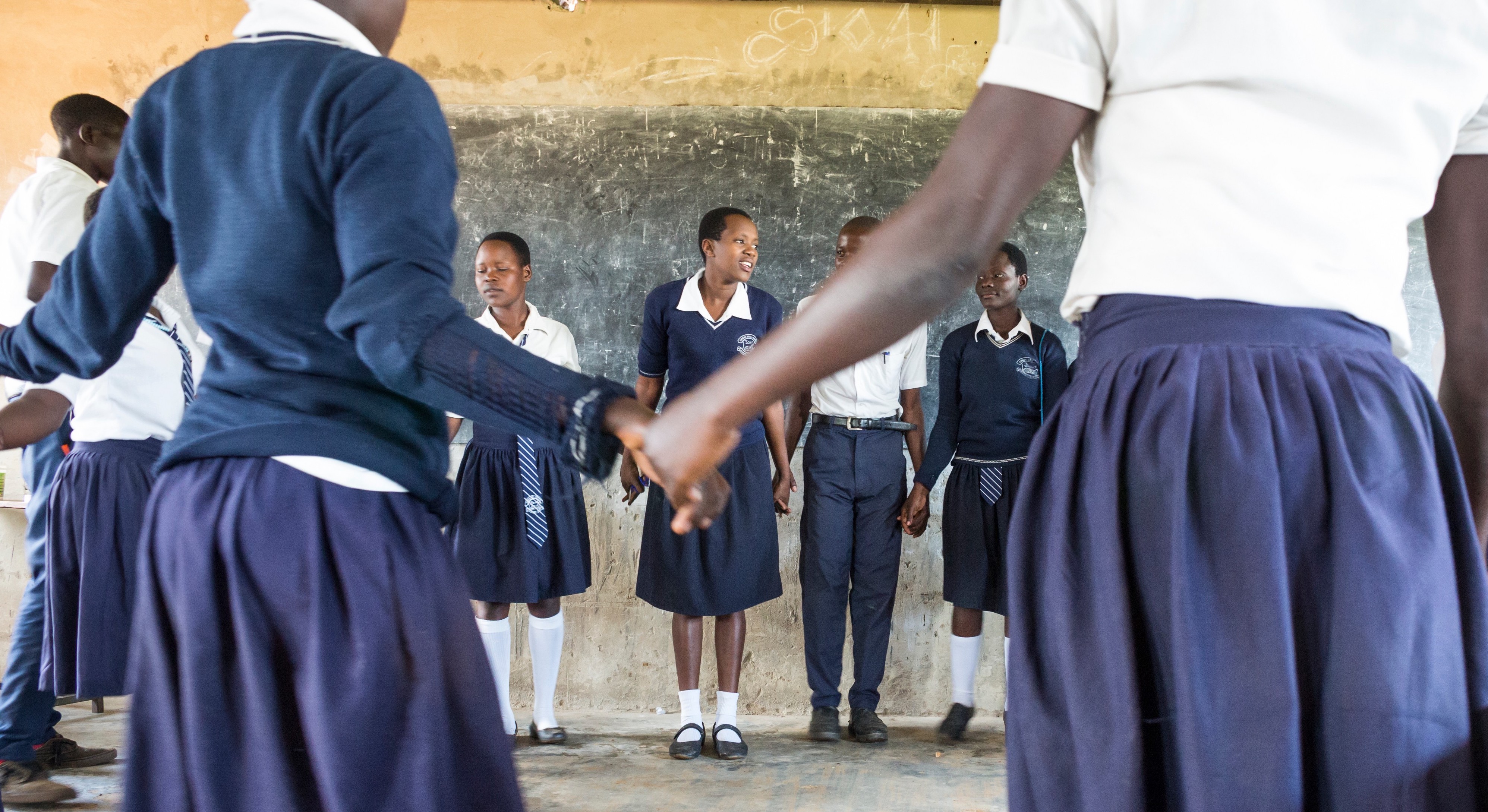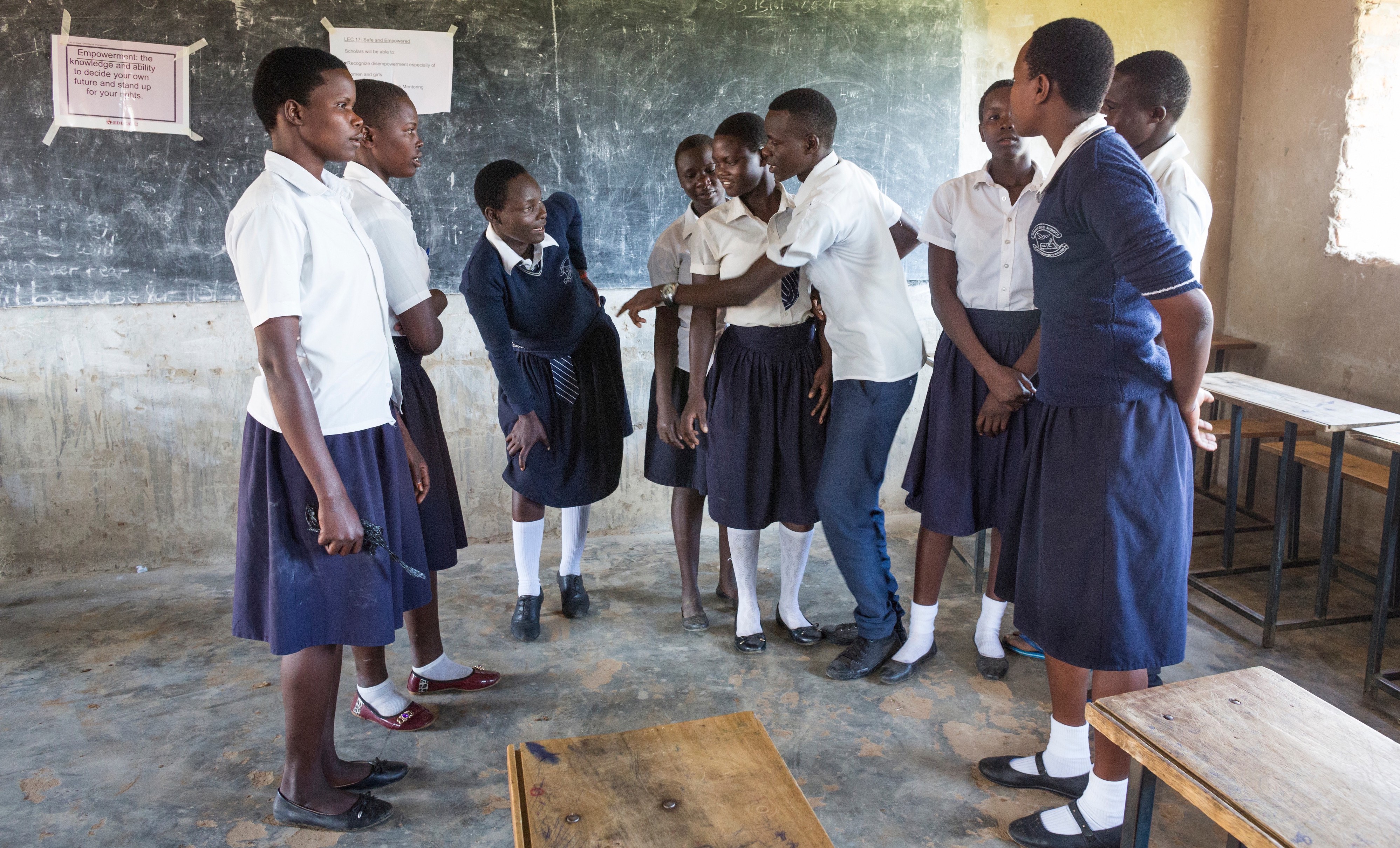Can Soft Skills Be Taught?
Meaningful, lasting impacts of a secondary school social leadership program in Uganda
This post, written by Laura Chioda (World Bank) with contributions from Paul Gertler (UC Berkeley), Meghan Mahoney (Educate!), Kat Blesie, and Lauren Russell, originally appeared on CEGA's Medium blog.

In Uganda, researchers find meaningful, lasting impacts of the Educate! youth skills development program.
Education systems in Africa face many challenges in equipping students with the skills needed to be successful in adulthood. While secondary schools are largely fee-based and require substantial investments for poorer families, graduates face few formal employment opportunities and often lack the entrepreneurial skills required to start or operate their own small businesses. Teaching students the hard and soft skills required to be successful entrepreneurs or to compete in the formal labor market has the potential to reduce youth unemployment, drive economic growth, and reduce poverty. But whether such skills can be taught is an open question and a priority for policymakers, NGOs, and researchers.
With funding from the Hewlett Foundation via CEGA’s Behavioral Economics in Reproductive Health Initiative (BERI), the Global Innovation Fund (GIF), IPA’s Intimate Partner Violence Initiative (IPV), and Wellspring Philanthropic Fund, Dana Carney (UC Berkeley), Laura Chioda (World Bank), David Contreras (UC Berkeley), and Paul Gertler (UC Berkeley, and also an affiliated researcher with IPA and CEGA) set out to answer these questions and explore the impact of hard and soft skills training on a variety of income-, social-, and gender-related outcomes for youth in Uganda.
The Educate! Experience program: which skills, how, and when
Researchers partnered with Educate!, a social enterprise that offers a leadership and social entrepreneurship skills development program across East Africa. The Educate! Experience program is implemented during the last two years of secondary school (in government, private, and community schools) and delivered by practically-trained youth mentors. The program teaches youth soft skills including both interpersonal skills—e.g., communication and teamwork—and intra-personal skills—e.g., self-confidence, critical thinking, creativity, and grit. Educate! sessions feature an interactive style and are student-centered; they require students to practice skills during class group work and activities. This method of teaching is in stark contrast with standard Ugandan passive learning methods.
The Educate! Experience program has three main components. First, a 35-lesson leadership and social entrepreneurship course is designed to teach students about socially responsible leadership, business entrepreneurship, and community engagement. Students also completed individual and group “personal projects,” like community initiatives and businesses, along with a group mentorship. A second key component of the program was one-on-one personal development mentorship by a youth mentor. Once every term, mentors held a group mentorship session with the entire class. Finally, students joined Student Business Development Clubs, designed to help students build projects that generate income.

Study design
During the 2012–2013 school year, the Educate! Experience program was successfully implemented as a full scale randomized controlled trial (RCT) in Uganda. Forty-eight schools were included in the study. Limited operational budgets meant Educate! was only able to implement the intervention in 24 of these schools, with the remaining 24 constituting the control group. The schools were randomly selected from six of the most populous districts in West, Central, and Eastern Uganda. From each of the chosen districts, eight schools were randomly selected to receive the Educate! program and eight to serve as the control group. Of a total of 1,942 students (43.6% female), 966 received the Educate! Experience training program and 976 did not.
A follow-up survey was conducted in 2017 to study program impacts on students’ skills, educational attainment, economic outcomes, community involvement. With funding from CEGA’s BERI, researchers also tested Educate!’s impact on fertility and sexual behaviors, while IPA-IPV funding allowed them to study impacts on women’s empowerment, gender norms, and IPV related outcomes.

Lasting Impact on Soft Skills, Investments in Education, and Social Spillovers
Preliminary results from a four-year follow up of Educate! in Uganda indicate that graduates saw meaningful, lasting increases in their soft skills after participating in the program. The Educate! Experience program has been extremely successful in improving youth’s intra- and inter-personal soft skills. Educate! graduates appear to focus more on long-term goals and report being more in control of aspects of their lives, as well as more empowered to implement actions towards achieving their plans.
Overall, Educate! graduates did not appear to possess more business knowledge than the comparison group. However, they were more likely to identify business opportunities and demonstrated better aptitude for deliberate dialogue. While the study found no impacts on political participation, community engagement, or trust in institutions, graduates exhibited significantly more prosocial attitudes—defined as an individual’s care for the community and intent to help others.
The shift toward long-term planning is also accompanied by additional investments in education, especially among women, who were 11% more likely to be enrolled in tertiary education. In general, those who participated in the Educate! program were more likely to graduate from secondary school and Educate! graduates were more likely to select business and STEM majors in tertiary education, pathways to possible improvements in future economic outcomes.
The program delivered positive and lasting social spillovers as well. Youth who participated in the program reported having fewer sexual partners, delayed family formation, and had fewer children than those in the control group. Students who participated in Educate! expressed more gender-egalitarian views and were less likely to justify IPV; women in the treatment group were also 18% less likely to report threats and incidences of physical violence than women in the control group.
These preliminary results found no relationship between Educate! training and employment rates, wages, or earnings. At the time of the follow-up, 35% of the sample was still enrolled in tertiary education; as such, it was too soon to fully assess economic impacts. The research team is currently fundraising to carry out an 8-year follow-up to assess long term impacts on an array of outcomes, including labor market outcomes.

Early Results Inform Program Design
In keeping with a history of using evidence to inform program design, Educate! is using these results to update the program’s curriculum. Following recommendations from the researchers and lessons from some of their other studies, Educate! has planned key revisions of the curriculum including adding negotiation skills modules, strengthening the focus on business and career planning, exploring new modalities to remain engaged with youth during high school and after they graduate from secondary school. The immediate policy impact of the evidence generated is significant: today, Educate! is scaling its model and working with nearly 50,000 youth through its direct delivery programs and reaching as many as 500,000 students through its education reform partnerships in Uganda, Rwanda, and Kenya, with plans to replicate its model across Sub-Saharan Africa.












